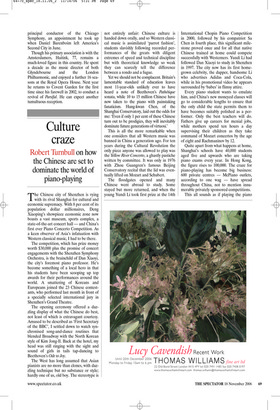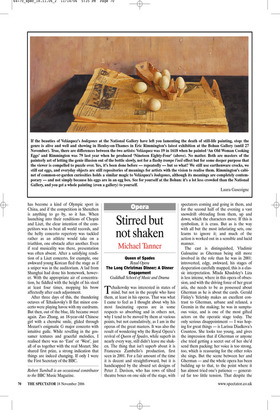Culture craze
Robert Turnbull on how the Chinese are set to dominate the world of piano-playing
The Chinese city of Shenzhen is vying with its rival Shanghai for cultural and economic supremacy. With 8 per cent of its population dollar millionaires, Deng Xiaoping’s showpiece economic zone now boasts a vast museum, sports complex, a state-of-the-art concert hall — and China’s first ever Piano Concerto Competition. As a keen observer of Asia’s infatuation with Western classical music, I had to be there.
The competition, which has prize money worth $30,000 plus the promise of concert engagements with the Shenzhen Symphony Orchestra, is the brainchild of Dan Xiaoyi, the city’s foremost piano professor. He’s become something of a local hero in that his students have been scooping up top awards for their performances around the world. A smattering of Koreans and Europeans joined the 23 Chinese contestants, who performed last month in front of a specially selected international jury in Shenzhen’s Grand Theatre.
The opening ceremony offered a dazzling display of what the Chinese do best, not least of which is extravagant courtesy. Amused to be described as ‘First Secretary of the BBC’, I settled down to watch synchronised song-and-dance routines that blended Broadway with the North Korean style of Kim Jong-Il. Back at the hotel, my head was still ringing with the sight and sound of girls in tails tap-dancing to Beethoven’s Ode to Joy.
The West has long assumed that Asian pianists are no more than clones, with dazzling technique but no substance or style; hardly one of us, old boy. The stereotype is not entirely unfair: Chinese culture is handed down orally, and so Western classical music is assimilated ‘parrot fashion’, students slavishly following recorded performances of the greats with diligent extremes of speed and technical discipline but with theoretical knowledge so weak they can scarcely tell the difference between a rondo and a fugue.
Yet we should not be complacent. Britain’s lamentable standard of education leaves most 11-year-olds unlikely ever to have heard a note of Beethoven’s Pathétique sonata, while 10 to 15 million Chinese have now taken to the piano with painstaking fanaticism. Hung-kwan Chen, of the Shanghai Conservatory, laid out the odds for me: ‘Even if only 1 per cent of these Chinese turn out to be prodigies, they will inevitably dominate future generations of virtuosi.’ This is all the more remarkable when one considers that all Western music was banned in China a generation ago. For ten years during the Cultural Revolution the only piece anyone was allowed to play was the Yellow River Concerto, a ghastly pastiche written by committee. It was only in 1976 with Zhou Guangren’s famous Beijing Conservatory recital that the lid was eventually lifted on Mozart and Schubert.
The floodgates opened and many Chinese went abroad to study. Some stayed but more returned, and when the young Yundi Li took first prize at the 14th International Chopin Piano Competition in 2000, followed by his compatriot Sa Chen in fourth place, this significant milestone proved once and for all that native Chinese trained at home could compete successfully with Westerners. Yundi Li had followed Dan Xiaoyi to study in Shenzhen in 1997. The city now has its first homegrown celebrity, the dapper, handsome Li who advertises Adidas and Coca-Cola, while in his promotional video he appears surrounded by ‘babes’ in flimsy attire.
Every piano student wants to emulate him, and China’s new moneyed classes will go to considerable lengths to ensure that the only child the state permits them to have becomes suitably polished as a performer. Only the best teachers will do. Fathers give up careers for menial jobs, while mothers spend ten hours a day supervising their children as they take command of Mozart concertos by the age of eight and Rachmaninov by 12.
Quite apart from what happens at home, Shanghai’s schools have 40,000 students aged five and upwards who are taking piano exams every year. In Hong Kong, the figure rises to 100,000. The craze for piano-playing has become big business: 600 private centres — McPiano outlets, according to one wag — have spread throughout China, not to mention innumerable privately sponsored competitions.
This all sounds as if playing the piano has become a kind of Olympic sport in China, and if the competition in Shenzhen is anything to go by, so it has. When launching into their renditions of Chopin and Liszt, the clear intention of the competitors was to beat all world records, and the hefty concerto repertory was tackled rather as an athlete would take on a triathlon, one obstacle after another. Even if real musicality was there, presentation was often absent. After a satisfying rendition of a Liszt concerto, for example, one awkward young Korean fled the stage as if a sniper was in the auditorium. A lad from Shanghai had done his homework, however. With the appropriate air of concentration, he fiddled with the height of his stool at least four times, mopping his brow affectedly after each adjustment.
After three days of this, the thundering octaves of Tchaikovsky’s B flat minor concerto were playing havoc with my eardrums. But then, out of the blue, life became sweet again. Zuo Zhang, an 18-year-old Chinese girl with a cherubic smile, glided through Mozart’s enigmatic G major concerto with intuitive guile. While revelling in the gossamer textures and graceful melodies, I realised there was no ‘East’ or ‘West’, just all of us together with the real Mozart. She shared first prize, a strong indication that things are indeed changing. If only I were the First Secretary of the BBC.



































































































 Previous page
Previous page